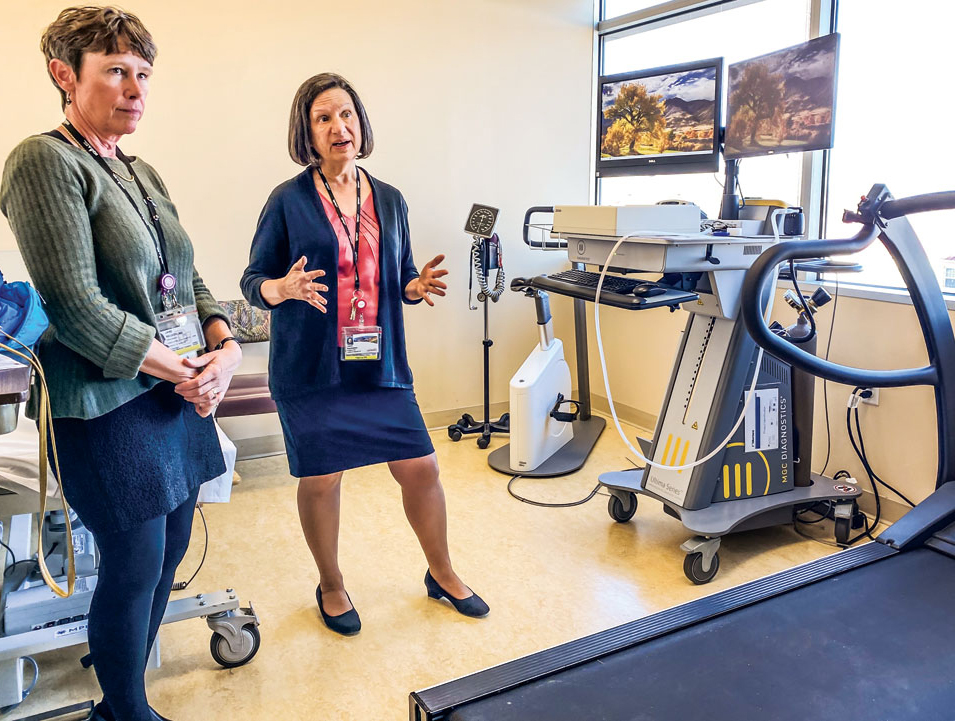
Dr. Jane Reusch and Dr. Judith Regensteiner stand in the lab where they conduct research on how sex, diabetes and cardiovascular health interact. Regensteiner is co-founder of the Center for Women’s Health Research at the CU Anschutz Medical Campus in Aurora. Front Porch photos by Christie Gosch.

Paisley Huntoon talks with Deirdre Rafferty, Senior Professional Research Assistant and Study Coordinator as she works out. Huntoon was diagnosed with Type 2 Diabetes earlier this year and signed up to participate in a diabetes/cardiovascular health research study at the Center for Women’s Health Research. Of her diagnosis, she says: “It is genetic in my family, so it wasn’t totally surprising.” When photographed, she was in the first week of the 15-week exercise program. “I would say I’m significantly better than I used to be since I’ve been taking my meds in June,” she says. “It’s been kind of cool to do some of these tests that I wouldn’t otherwise have been exposed to. And everyone is super helpful and answers all of my questions.” The Center’s researchers study a range of healthcare issues where sex and gender may play a role in symptoms, outcomes, or treatment.
Notwithstanding the pink ribbons adorning license plates and yogurt lids to raise breast cancer awareness, heart disease is actually the number one killer of women in the U.S., with 25 percent of women’s deaths due to cardiovascular disease each year. This figure is higher than all cancers combined, according to the Centers for Disease Control and Prevention (CDC). Though some differences emerge when viewed by race and ethnicity, heart disease remains within the top two causes of death for Hispanic, Black, Native American, and Asian women in the U.S. And surprisingly, until relatively recently, most studies of cardiovascular health centered on men.
“The truth is that women have been very understudied over the years…it’s really kind of shocking; it’s actually worse than you think, not better than you think,” says Dr. Judy Regensteiner, Director and Co-Founder of the Center for Women’s Health Research at the University of Colorado Anschutz Medical Campus. In fact, the warning signs for heart attack and the characteristics of heart failure and coronary disease manifest differently in men and women. Sex differences are not confined to symptoms, but may also include treatment protocols and medications.
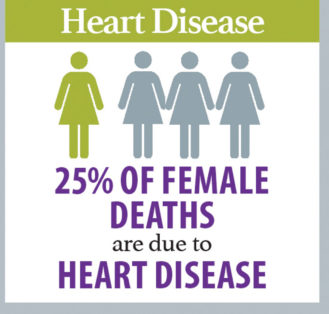 “Of the top 20 drugs that are prescribed in this country, the majority were not approved with enough information on women—there weren’t enough women in the studies to determine if they worked the same in women,” says Regensteiner. In fact, a 2001 Government Accountability Office report found that 8 out of the 10 prescription drugs withdrawn from the market between 1997 and 2000 posed greater health risks for women than for men.
“Of the top 20 drugs that are prescribed in this country, the majority were not approved with enough information on women—there weren’t enough women in the studies to determine if they worked the same in women,” says Regensteiner. In fact, a 2001 Government Accountability Office report found that 8 out of the 10 prescription drugs withdrawn from the market between 1997 and 2000 posed greater health risks for women than for men.
When Regensteiner and two of her colleagues in 2004 established the Center for Women’s Health Research, they envisioned a place that would undertake “cutting-edge research in women’s health and sex differences.” But don’t be misled by the name. The Center actually studies both women and men to understand the relationship of sex and gender to cardiovascular health, diabetes, and mental health. Supporting research is the Center’s first pillar.
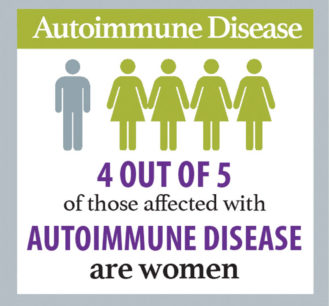 The Center’s second pillar is mentoring young scholars. The Center also provides grants to researchers. To date, over 70 MDs and PhDs have been awarded funding for projects that range from “basic science” (mice and molecules) to epidemiological studies. And yes, even when using mice, the studies rely on female and male mice. “This is such a new field,” reflects Regensteiner, who says that it was only in 1993, with the National Institutes of Health (NIH) Revitalization Act, that clinical research had to include women and minorities. The Center also has a grant that allows researchers whose work might otherwise be interrupted due to health concerns or a family issue, to hire help during a hiatus from the lab.
The Center’s second pillar is mentoring young scholars. The Center also provides grants to researchers. To date, over 70 MDs and PhDs have been awarded funding for projects that range from “basic science” (mice and molecules) to epidemiological studies. And yes, even when using mice, the studies rely on female and male mice. “This is such a new field,” reflects Regensteiner, who says that it was only in 1993, with the National Institutes of Health (NIH) Revitalization Act, that clinical research had to include women and minorities. The Center also has a grant that allows researchers whose work might otherwise be interrupted due to health concerns or a family issue, to hire help during a hiatus from the lab.
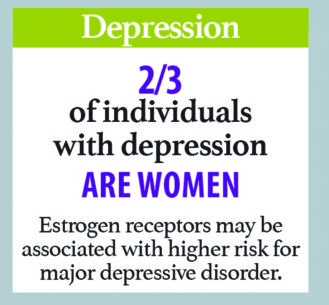 Endocrinologist Dr. Jane Reusch views the Center’s grants as “seed money” for many researchers, who might use the $25,000-$50,000 they receive to launch a small study. That study then has the potential to be translated into a larger grant down the road, when NIH sees preliminary results from a pilot study. The Center has distributed about $1,700,000 in grants over the years, and its researchers have leveraged those studies into $78,000,000 in NIH grants.
Endocrinologist Dr. Jane Reusch views the Center’s grants as “seed money” for many researchers, who might use the $25,000-$50,000 they receive to launch a small study. That study then has the potential to be translated into a larger grant down the road, when NIH sees preliminary results from a pilot study. The Center has distributed about $1,700,000 in grants over the years, and its researchers have leveraged those studies into $78,000,000 in NIH grants.
Reusch and Regensteiner, whose research together focuses on diabetes, have new insights on “these crazy discrepancies in our knowledge of how to treat women.” Their work demonstrates that “women, the minute they develop diabetes, all of a sudden have the same risk as a man for having a cardiovascular event.” In other words, the “cardioprotection” premenopausal women normally have disappears when a woman has diabetes; additionally, women with diabetes have a higher risk of blindness than men.
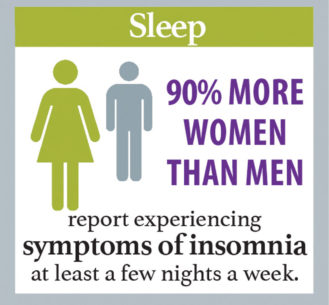 “Neither one of us can do what we do on our own, or at least not as well; and that is why it’s so great to be doing research at a school of medicine and have that opportunity to continuously learn from everybody around us,” says Reusch.
“Neither one of us can do what we do on our own, or at least not as well; and that is why it’s so great to be doing research at a school of medicine and have that opportunity to continuously learn from everybody around us,” says Reusch.
The Center’s third pillar is public outreach. The Center shares it research with the general public and the medical community to ensure that their researchers’ findings do not remain confined to laboratories or the medical ivory tower. An upcoming public event on Dec. 12 is highlighted above.
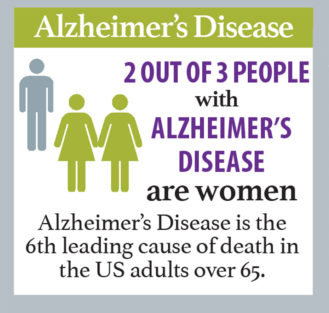 Over 13 million women in the U.S. have diabetes, according to the Center, which is seeking sedentary men and women aged 30-55 for a compensated research study that includes 4 months of supervised exercise training. They need participants with Type 2 diabetes but no diabetes complications and others without diabetes for the control group. To learn more, contact Deirdre.rafferty@cuanschutz.edu or call 720-848-6688.
Over 13 million women in the U.S. have diabetes, according to the Center, which is seeking sedentary men and women aged 30-55 for a compensated research study that includes 4 months of supervised exercise training. They need participants with Type 2 diabetes but no diabetes complications and others without diabetes for the control group. To learn more, contact Deirdre.rafferty@cuanschutz.edu or call 720-848-6688.
The graphics with women’s health statistics are courtesy of the Center for Women’s Health Research.
You Are Invited
Center for Women’s Health Research “Let’s Talk” Series
December 12— “Inside and Out: Understanding Important
Parts of the Body and What They Mean for Your Health.”
5:15 – 6pm Light Dinner ––– 6-8pm Program
Register and pay by Dec. 9 at www.cwhr.org. $10 fee for dinner.
Bruce Schroffel Conference Auditorium Anschutz Inpatient Pavilion 2, 12505 East 16th Ave., Aurora
Call 303-724-0305 for more information.


0 Comments